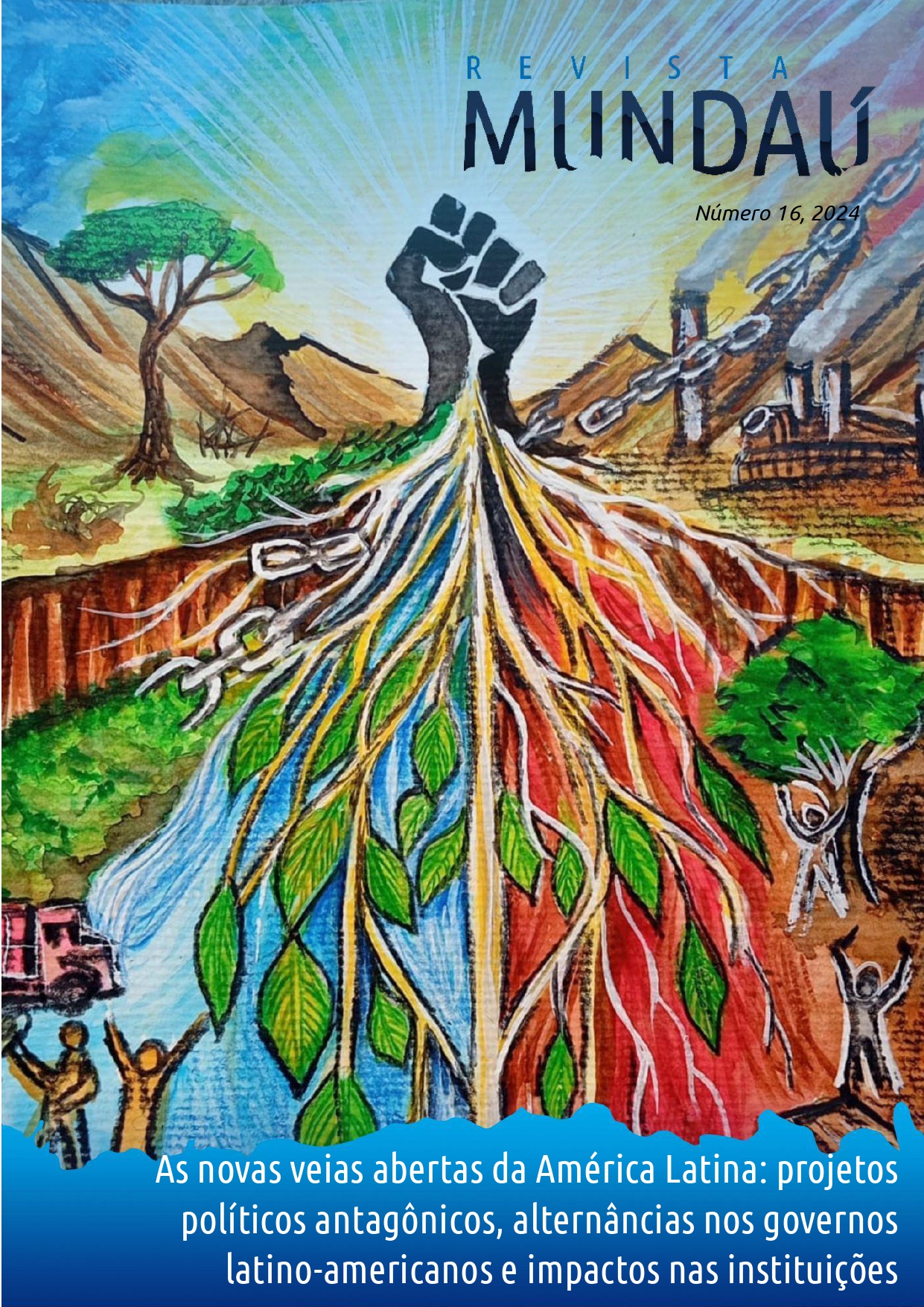Militares e estratégias não-convencionais de política no Brasil: configurando parâmetros para uma tomada de poder de Estado
DOI:
https://doi.org/10.28998/rm.2024.n.16.17795Palavras-chave:
Militares, Política, Guerra Híbrida, Eleições, BolsonaroResumo
Este artigo pretende analisar os modos que militares produziram a candidatura de Jair Bolsonaro à Presidência em 2018, observando o fato de que a opção por o lançar a este cargo foi inaugurada em 2014 dentro de um estabelecimento militar. Considerando que Bolsonaro (e seu então Vice-Presidente) eram militares, minha intenção é recuperar o vínculo entre esta ação política e uma ação militar propriamente dita, operando na lógica da guerra. Para tanto, lanço mão de uma categoria nativa que começa a circular entre militares brasileiros justamente no em 2014, a de “guerra híbrida”. Um rápido sobrevoo ao modo como ela foi concebida desde seus primeiros usos, em meados dos anos 2000, sugere que alguns de seus aspectos foram utilizados de forma inédita aqui no Brasil.
Downloads
Referências
ALONSO, Angela. A política das ruas: protestos em São Paulo de Dilma a Temer. Novos Estudos Cebrap, número especial, p. 49-58, 2017.
AVRITZER, Leonardo; KERCHE, Fábio; MARONA, Marjorie (Orgs.). Governo Bolsonaro: retrocesso democrático e degradação política. Belo Horizonte: Autêntica, 2021.
BATESON, Gregory. Naven. Stanford: Stanford University Press, 1958.
BEN-ARI, Eyal. Mastering soldiers: conflict, emotions, and the enemy in an Israeli military unit. Oxford: Berghahn, 1998.
BEN-ARI, Eyal et al. Rethinking Contemporary Warfare. New York: State University of New York, 2010.
BOYD, John R. The essence of winning and losing. Unpublished lecture notes, v. 12, n. 23, p. 123-125, 1996.
CASTRO, Celso. General Villas Bôas: conversa com o comandante. Rio de Janeiro: FGV, 2021.
CESARINO, Leticia. Ethnography of refracted publics: from digital populism to alt-science ecosystems. Paper presented at the “Friday Seminars”, LSE, 28 may 2021. Mimeo.
CLAUSEWITZ, Carl Von. On war. Princeton: Princeton University Press, 2008.
CORAM, Robert. Boyd: The fighter pilot who changed the art of war. New York: Little, Brown & Co., 2002.
DENT, Alexander S.; MACHADO, Rosana Pinheiro. Protesting democracy in Brazil. Society for Cultural Anthropology Hot Spots. December 20, 2013. Disponível em: https://culanth.org/fieldsights/426-protesting-democracy-in-brazil. Acesso em: 6 dez. 2024.
DUNLAP, Charles. Law and Military Interventions: preserving humanitarian values in 21st century conflicts. Working Paper. Cambridge: Harvard University (John F. Kennedy School of Government), 2001.
ENGDAHL, William. Full Spectrum Dominance: Totalitarian Democracy in the New World Order. Wiesbaden: Edition Engdahl, 2009.
ESCOBAR, Pepe. O Brasil no epicentro da Guerra Híbrida, Pepe Escobar. GGN: O Jornal de Todos os Brasis, 7 de Junho de 2016. Disponível em: https://jornalggn.com.br/analise/o-brasil-no-epicentro-da-guerra-hibrida-por-pepe-escobar/. Acesso em: 6 dez. 2024.
FORD, Daniel. A vision so noble: John Boyd, the OODA Loop, and America’s War on Terror. Durham: Warbird Books, 2010.
GONZÁLEZ, Roberto J. ‘Human terrain’: Past, present and future applications. Anthropology Today, v. 24, n. 1, p. 21-26, 2008.
GRAHAM, Stephen. Cities Under Siege: The new military urbanism. London: Verso, 2010.
HOFFMAN, Frank. Conflict in the 21st century: The rise of the hybrid wars. Arlington: Potomac Institute for Policy Studies, 2007.
KORYBKO, Andrew. Hybrid wars: The indirect adaptive approach to regime change. Moscow: PFUR, 2015.
LEIRNER, Piero. O Brasil no Espectro de uma Guerra Híbrida: militares, operações psicológicas e política em uma perspectiva etnográfica. 2ª ed. São Paulo: Alameda, 2022 [2020].
LEIRNER, Piero. Ensaio sobre 2013 e uma Guerra Híbrida Fora de Lugar. R@U: Revista de Antropologia da UFSCar, v. 15, n. 1, p. 142-200, 2023.
LIANG, Qiao; XIANGSUI, Wang. Unrestricted Warfare. Beijing: PLA Literature and Arts Publishing House, 1999.
LIND, William S. Fourth-generation warfare's first blow: a quick look. Marine Corps Gazette, v. 85, n. 11, p. 72-72, 2001.
MAYA; Romulus; LEIRNER, Piero. Urgente: EUA planejam derrubar avião brasileiro e culpar Venezuela? Duplo Expresso. 16 mai. de 2019. Disponível em: https://duploexpresso.com/?p=104661. Acesso em: 6 dez. 2024.
MATTIS, James N.; HOFFMAN, Frank. Future warfare: The rise of hybrid wars. Proceedings-United States Naval Institute, v. 131, n. 11, p. 18, 2005.
NCA - Network of Concerned Anthropologists. The counter-counterinsurgency manual; or, Notes on demilitarizing American society. Chicago: Prickly Paradigm Press, 2009.
OSINGA, Frans. Science, strategy and war: The strategic theory of John Boyd. Delft: Eburon Academic Publishers, 2005. Disponível em: http://chicagoboyz.net/blogfiles/OsingaBoydThesis.pdf. Acesso em: 6 dez. 2024.
PRICE, David H. Weaponizing anthropology. Petrolia: CounterPunch, 2011.
RICHARDS, Chet. Boyd’s OODA Loop (it’s not what you think). March 21, 2012.Disponível em: https://www.academia.edu/26030432/Boyds_OODA_Loop_Its_Not_What_You_Think_Introduction_A_Non-school_of_Strategy. Acesso em: 6 dez. 2024.
RODRIGUES, Thiago. Narcotráfico, militarização e pacificações: novas securitizações no Brasil. In: PASSOS, Rodrigo; FUCCILE, Alexandre (Org.). Visões do Sul: crise e transformações do sistema internacional. Volume 2. Marília: Oficina Universitária; São Paulo: Cultura Acadêmica, 2016. p. 55-87.
SSORIN-CHAIKOV, Nikolai. Hybrid peace: Ethnographies of war. Annual Review of Anthropology, v. 47, n. 1, p. 251-262, 2018.
SZAFRANSKI, Richard. Neocortical warfare? The acme of skill. Santa Monica: RAND Corporation, 1994. Disponível em: http://www.rand.org/content/dam/rand/pubs/monograph_reports/MR880/MR880.ch17.pdf. Acesso em: 6 dez. 2024.
VIRILIO, Paul. Velocidade e política. São Paulo: Estação Liberdade, 1997.
VIRILIO, Paul; LOTRINGER, Sylvère. Pure war. Los Angeles: Semiotext(e), 2003.
WEIZMAN, Eyal. Walking Through Walls: Soldiers as architects in the Israeli–Palestinian conflict. Radical Philosophy, 2006. Disponível em: https://www.radicalphilosophy.com/article/walking-through-walls. Acesso em: 6 dez. 2024.
WEIZMAN, Eyal. Hollow land: Israel’s architecture of occupation. London: Verso, 2007.
ZANIN, Cristiano; MARTINS, Waleska; VALIM, Rafael. Lawfare: uma introdução. São Paulo: Contracorrente, 2020.








